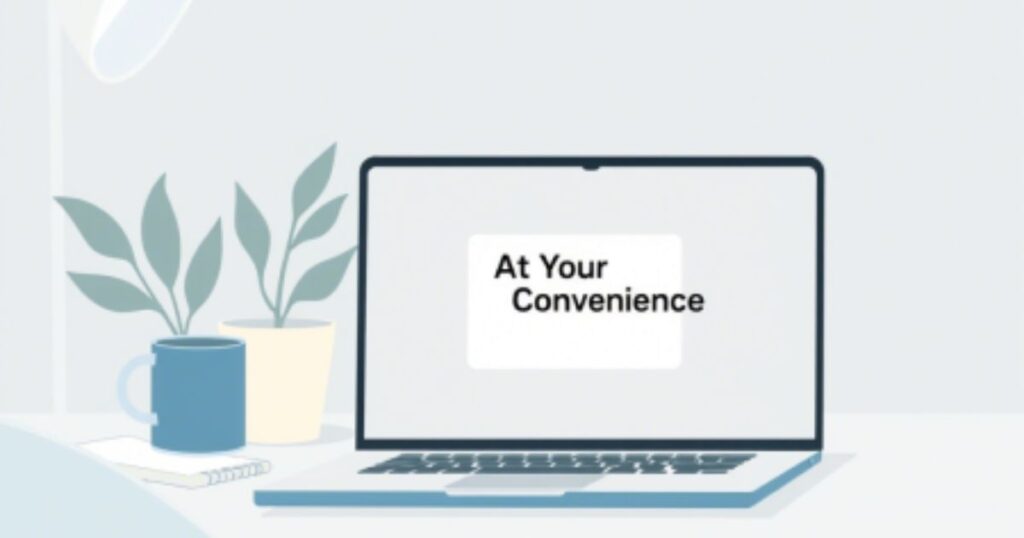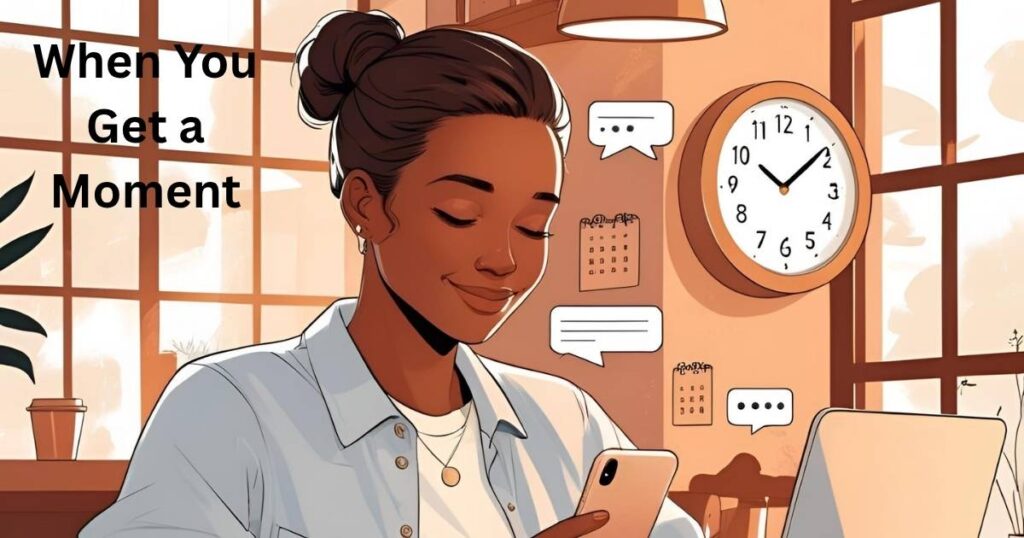In everyday life and work, we often need to ask someone for help or a response without sounding pushy. One common phrase we use is When You Get a Chance. It’s polite and respectful, but if you use it too often, it can start to feel repetitive or lose its impact. That’s why having different ways to say When You Get a Chance can make your communication sound more thoughtful and fresh.
Whether you’re sending an email to a coworker, texting a friend, or speaking in a meeting, the right words matter. Using new phrases instead of When You Get a Chance shows that you respect the other person’s time and busy schedule. It also makes your message feel more personal and kind. This article will give you simple and friendly alternatives you can use anytime, helping you sound more natural while still being clear and professional in your tone.
Main Points
The phrase “when you get a chance” is used when you’re asking someone to do something, but you want to be polite. You don’t want to pressure them. It shows you care about their time, responsibilities, and commitments. It’s often used in the workplace or between friends when something isn’t super urgent.
There are many other ways to say it. Some sound more formal, and some are casual. But they all give the other person space to choose when to help you. Using these phrases the right way builds better relationships, helps with collaboration, and makes communication more effective. It creates a friendly and productive environment where people feel respected and valued.
Say things in a kind way that shows respect for someone’s time.
Don’t make it sound like you are rushing the other person.
Use different words so you don’t say the same thing every time.
Try to sound friendly and professional at the same time.
Use words that help the person feel relaxed, not stressed.
Make sure your message is clear but also polite.
Use short and simple phrases to make things easy to understand.
Show that you care about the other person’s busy schedule.
Talk in a way that sounds natural and not like a robot.
Use the right tone to build better communication with others.
At Your Convenience

The phrase at your convenience is a kind and formal way to ask someone to do something when it suits them. It shows respect and understanding of their schedule. This phrase is great for emails at work or when writing to someone you don’t know well. It gives them full control of when to respond or help you, which helps build trust and a good working relationship.
Saying at your convenience is also helpful when trying to be considerate. It creates a calm and flexible atmosphere, which can lead to better collaboration and fewer misunderstandings. In a busy world where people have many commitments, giving them the chance to help you when it’s suitable makes your request sound polite and professional.
When You Have Time
When you have time, it sounds casual and friendly. You might use this with coworkers or friends when you don’t want to rush them. It shows you know they’re busy and you’re being considerate of their time and commitments. This phrase helps you sound kind and thoughtful, even when you’re asking for help.
Using this also shows that you understand how to prioritize and manage boundaries. Everyone has different styles of scheduling and time management. By saying this, you’re giving them autonomy to help when it works for them. It creates a more harmonious and constructive way of working or talking together.
When Possible
Saying when possible is a great way to ask for something while still being polite. It respects the other person’s availability, obligations, and constraints. It’s especially good when working with teams, because it allows for negotiation and gives room for delegation without sounding demanding.
This phrase works well in both work and personal settings. It’s soft, but still clear. It tells the person that it’s not urgent, but it’s still something important to you. In busy environments, this phrase helps others feel empowered to choose the best time, helping to build better interactions and improve balance.
Whenever You Can
Whenever you can, be friendly and casual. It shows that you care about the other person’s schedule and are okay with waiting. It helps create a low-pressure, teamwork-focused feeling. It’s perfect for coworkers or friends you speak to often.
This phrase also supports a mindset of kindness and collaboration. When you say this, you’re allowing others to accommodate your request in a way that fits into their responsibilities and daily tasks. It promotes a more flexible way of communication and makes your approach feel relaxed and human.
At Your Leisure
At your leisure is a calm and kind phrase. It means “whenever it suits you” and is often used when there’s no rush. It’s perfect for low-pressure questions where you’re being very polite. It shows you care about the person’s lifestyle, relaxation, and well-being.
This phrase supports an idea of balance and gives people space to handle things at their own pace. It fits well in emails or messages where you want to sound warm and considerate. Using it promotes an environment of mindfulness and shows that you respect their downtime and self-care.
Find more words!
If you often say “when you get a chance,” it’s good to have other options ready. Try using some of the phrases above in your daily emails or texts. You’ll sound more natural, polite, and clear. There are many simple ways to express the same idea, and using different words shows that you care about how you speak and listen.
Changing your words a little can make a big difference in how people respond. When we speak with understanding and kindness, we create better connections. Try using phrases that match the tone, urgency, and situation you’re in. It makes your message more personal and more human.
Read this Also: 20 Other Ways to Say “Have a Nice Day”
When You’re Free
When you’re free, it is casual and thoughtful. It tells someone to help or respond only if they have time. It’s a phrase that gives people freedom, which leads to better collaboration and less pressure in the workplace.
This is a great option in friendly or casual chats. It works well when you don’t want to bother someone or interrupt their day. You’re showing that their schedule, responsibilities, and tasks matter. It helps build a good atmosphere for honest and open communication.
When You Get a Moment

When you get a moment, it is gentle and respectful. It’s used when you know someone is busy, but you still want them to respond or help when they find a little time. It shows that you understand how valuable their time and attention are.
This phrase supports thoughtful communication. You’re being mindful of their pace and allowing them to engage when it feels right. It also shows appreciation, as if you’re saying, “I know you’re busy, but I’d still like your help.” It creates a soft and friendly conversation.
As Soon As You Can
Sometimes, things are more urgent. As soon as you can, it is a good way to ask for something quickly without sounding too harsh. It still sounds polite, but it adds a little more importance and urgency to your request.
This phrase is great for work settings where follow-ups, deadlines, or planning are involved. It lets the person know the task is needed sooner, but they still have some control over scheduling. It supports effective teamwork and shows that you understand their workload while still getting things done.
When It’s Convenient
When it’s convenient is a calm and polite phrase that gives others the freedom to choose the best time to respond or help. It supports a healthy balance in communication and keeps things friendly and smooth.
This phrase is helpful in both personal and work settings. It fits well in teams where people have different priorities or tasks. It supports good management, clear planning, and strong collaborations. Using it helps keep the work environment respectful and relaxed.
When You Have a Spare Minute
This phrase is great for small tasks. If you need someone to read a short email, check something quickly, or send a fast reply, when you have a spare minute is perfect. It shows you know they’re busy but the task won’t take long.
It helps keep things light and simple. People feel more open to help when they know something won’t take much time. It also respects their workload and lets them respond without stress. It keeps the momentum going in a productive way and improves everyday workflow.
At Your Earliest Opportunity

This is a more formal way to ask for something soon, but it still sounds polite. Your earliest opportunity is often used in professional emails when something needs attention without delay.
It shows that you understand timeliness but still want to be considerate. It’s about good etiquette, especially in work settings. This phrase works well when dealing with important tasks, team efforts, or project reminders. It creates a culture of responsibility and accountability.
When You Have a Break
When you have a break, be relaxed and kind. It means the person should respond or help only after they’ve had time to rest. It supports a healthy work-life balance and shows that you care about their well-being and clarity.
It’s perfect for use with coworkers or team members. When you say this, you let people know that their relaxation, creativity, and personal activities matter too. It promotes a better environment where everyone feels respected and supported.
Let Me Know When You’re Ready
This is a kind and easy way to ask for something. It tells the person there’s no rush. You’re waiting until they feel it’s the right time. It gives them freedom and shows respect for their time and responsibilities.
People feel more relaxed when you say this. It helps build good communication. It shows you care about their schedule and want to work together in a calm and flexible way. It’s great for friends or coworkers who are busy.
If Now’s Not a Good Time
This is a helpful phrase when someone may be busy. It shows that you understand their situation. You’re letting them choose a better time if now doesn’t work. That feels considerate and understanding.
It helps people feel less pressure. They know they can take care of things later. It creates a more comfortable space for both of you. It also helps avoid stress or miscommunication.
No Rush At All
This is a very friendly and soft way to speak. It tells the person they don’t need to hurry. You’re letting them take their time. It shows that you’re thoughtful, and you trust them to help when they can.
This phrase is useful when there’s no urgency. It makes the conversation smoother. It also makes people more willing to help. They know you’re being kind and not pushing too hard.
Only If It Works for You
This phrase gives the other person full control. You’re clearly saying, “I’m okay if you can’t do it.” That kind of flexibility and kindness can go a long way. It builds strong relationships at work or in life.
It’s also good for keeping things balanced. People often have a lot going on. By saying this, you show you care about their comfort, their tasks, and their schedule. It’s a very warm and polite way to ask.
Get Back to Me When You Can

This is an easy and clear phrase. It means the person can reply or help when they’re ready. You don’t need it right now. You’re giving them space and time. That shows trust and patience.
People appreciate this kind of language. It’s soft and respectful. It helps make the talk feel friendly. This phrase fits well for emails or messages, especially in a busy environment.
FAQ’s
What is a better word for chance?
A better word for chance can be opportunity, moment, or spare time, especially when saying when you get a chance politely in conversations.
What do you say when you get a chance?
You can say when you get a chance at your convenience, when you’re free, or if you have time, all sound friendly.
What is it called when you take a chance?
When you take a chance, it means you’re making a bold move or risk, not like the polite way we use when you get a chance.
What is another word for giving a chance?
Giving a chance can also mean offering an opportunity, permission, or freedom, just like saying when you get a chance in soft requests.
Why do people say when you get a chance?
People say when you get a chance to sound polite, show respect for others’ time, and avoid putting pressure on them to respond fast.
Conclusion
Using different ways to say When You Get a Chance helps you sound more polite and friendly. It shows respect for other people’s time. You can use When You Get a Chance in emails, texts, or at work. It fits many situations and keeps your tone soft and kind. Phrases like When You Get a Chance help you ask for help without sounding pushy. They are useful in personal and professional life.
When you use When You Get a Chance, you let others respond when they are ready. This creates a calm and respectful feeling. People like it when they don’t feel rushed. Saying When You Get a Chance builds better relationships. It’s a small phrase with big meaning. Try using When You Get a Chance often in your messages. You’ll notice better replies and nicer conversations. It’s simple, helpful, and always polite to say When You Get a Chance.

Gramcoachpro is your go-to platform for mastering grammar, writing, and communication skills. If you’re a student, teacher, or content creator, we provide easy-to-understand tips, examples, and tools to improve your language — fast and effectively. Our mission is to make better writing simple and accessible for everyone.

